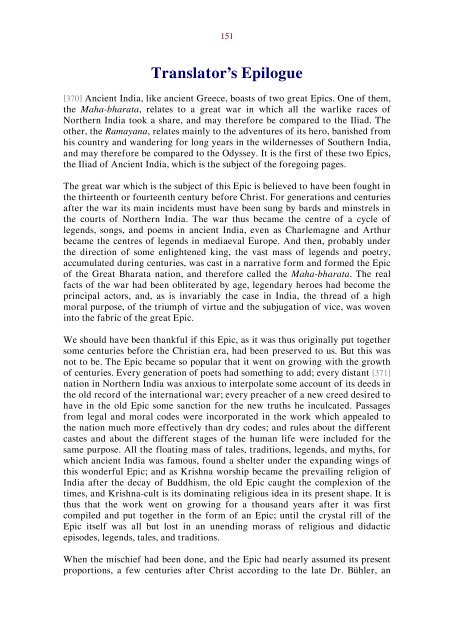Mahabharata, Epic of the Bharatas
An Abbreviated Translation of the Indian Classic, the Mahabharata by Romesh Chundar Dutt in 2,000 verses
An Abbreviated Translation of the Indian Classic, the Mahabharata by Romesh Chundar Dutt in 2,000 verses
Create successful ePaper yourself
Turn your PDF publications into a flip-book with our unique Google optimized e-Paper software.
151<br />
Translator’s Epilogue<br />
[370] Ancient India, like ancient Greece, boasts <strong>of</strong> two great <strong>Epic</strong>s. One <strong>of</strong> <strong>the</strong>m,<br />
<strong>the</strong> Maha-bharata, relates to a great war in which all <strong>the</strong> warlike races <strong>of</strong><br />
Nor<strong>the</strong>rn India took a share, and may <strong>the</strong>refore be compared to <strong>the</strong> Iliad. The<br />
o<strong>the</strong>r, <strong>the</strong> Ramayana, relates mainly to <strong>the</strong> adventures <strong>of</strong> its hero, banished from<br />
his country and wandering for long years in <strong>the</strong> wildernesses <strong>of</strong> Sou<strong>the</strong>rn India,<br />
and may <strong>the</strong>refore be compared to <strong>the</strong> Odyssey. It is <strong>the</strong> first <strong>of</strong> <strong>the</strong>se two <strong>Epic</strong>s,<br />
<strong>the</strong> Iliad <strong>of</strong> Ancient India, which is <strong>the</strong> subject <strong>of</strong> <strong>the</strong> foregoing pages.<br />
The great war which is <strong>the</strong> subject <strong>of</strong> this <strong>Epic</strong> is believed to have been fought in<br />
<strong>the</strong> thirteenth or fourteenth century before Christ. For generations and centuries<br />
after <strong>the</strong> war its main incidents must have been sung by bards and minstrels in<br />
<strong>the</strong> courts <strong>of</strong> Nor<strong>the</strong>rn India. The war thus became <strong>the</strong> centre <strong>of</strong> a cycle <strong>of</strong><br />
legends, songs, and poems in ancient India, even as Charlemagne and Arthur<br />
became <strong>the</strong> centres <strong>of</strong> legends in mediaeval Europe. And <strong>the</strong>n, probably under<br />
<strong>the</strong> direction <strong>of</strong> some enlightened king, <strong>the</strong> vast mass <strong>of</strong> legends and poetry,<br />
accumulated during centuries, was cast in a narrative form and formed <strong>the</strong> <strong>Epic</strong><br />
<strong>of</strong> <strong>the</strong> Great Bharata nation, and <strong>the</strong>refore called <strong>the</strong> Maha-bharata. The real<br />
facts <strong>of</strong> <strong>the</strong> war had been obliterated by age, legendary heroes had become <strong>the</strong><br />
principal actors, and, as is invariably <strong>the</strong> case in India, <strong>the</strong> thread <strong>of</strong> a high<br />
moral purpose, <strong>of</strong> <strong>the</strong> triumph <strong>of</strong> virtue and <strong>the</strong> subjugation <strong>of</strong> vice, was woven<br />
into <strong>the</strong> fabric <strong>of</strong> <strong>the</strong> great <strong>Epic</strong>.<br />
We should have been thankful if this <strong>Epic</strong>, as it was thus originally put toge<strong>the</strong>r<br />
some centuries before <strong>the</strong> Christian era, had been preserved to us. But this was<br />
not to be. The <strong>Epic</strong> became so popular that it went on growing with <strong>the</strong> growth<br />
<strong>of</strong> centuries. Every generation <strong>of</strong> poets had something to add; every distant [371]<br />
nation in Nor<strong>the</strong>rn India was anxious to interpolate some account <strong>of</strong> its deeds in<br />
<strong>the</strong> old record <strong>of</strong> <strong>the</strong> international war; every preacher <strong>of</strong> a new creed desired to<br />
have in <strong>the</strong> old <strong>Epic</strong> some sanction for <strong>the</strong> new truths he inculcated. Passages<br />
from legal and moral codes were incorporated in <strong>the</strong> work which appealed to<br />
<strong>the</strong> nation much more effectively than dry codes; and rules about <strong>the</strong> different<br />
castes and about <strong>the</strong> different stages <strong>of</strong> <strong>the</strong> human life were included for <strong>the</strong><br />
same purpose. All <strong>the</strong> floating mass <strong>of</strong> tales, traditions, legends, and myths, for<br />
which ancient India was famous, found a shelter under <strong>the</strong> expanding wings <strong>of</strong><br />
this wonderful <strong>Epic</strong>; and as Krishna worship became <strong>the</strong> prevailing religion <strong>of</strong><br />
India after <strong>the</strong> decay <strong>of</strong> Buddhism, <strong>the</strong> old <strong>Epic</strong> caught <strong>the</strong> complexion <strong>of</strong> <strong>the</strong><br />
times, and Krishna-cult is its dominating religious idea in its present shape. It is<br />
thus that <strong>the</strong> work went on growing for a thousand years after it was first<br />
compiled and put toge<strong>the</strong>r in <strong>the</strong> form <strong>of</strong> an <strong>Epic</strong>; until <strong>the</strong> crystal rill <strong>of</strong> <strong>the</strong><br />
<strong>Epic</strong> itself was all but lost in an unending morass <strong>of</strong> religious and didactic<br />
episodes, legends, tales, and traditions.<br />
When <strong>the</strong> mischief had been done, and <strong>the</strong> <strong>Epic</strong> had nearly assumed its present<br />
proportions, a few centuries after Christ according to <strong>the</strong> late Dr. Bühler, an

















